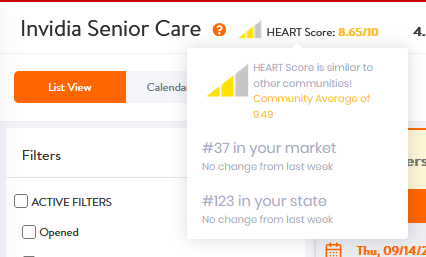What is HEART Score?
HEART score is a scoring system based on a set of interactions that influence HERO and community experiences with one another. These valuable data insights can drive change behavior and transform operations to increase KARE success and HERO satisfaction.
What is Scored?
HEART Scores are calculated based on the following set of actions that a community takes with a HERO:
- Length of time until shift verification
- Shift cancellation timing
- Status of a shift when canceled
- Shift description lengths
- HERO applicant approval times
- Post-shift HERO review length and detail
Why is this being implemented?
We believe that having positive shared experiences on KARE is beneficial for communities and Heroes. Heroes gain a better understanding of the communities they are applying to work for by referencing HEART score, while communities will have improved access to feedback regarding their actions and how those actions affect their success on KARE. This will enable operational leaders to make better-informed decisions on procedures. In addition, KARE account managers will be able to provide coaching opportunities as they see fit if a community is struggling.
Where can I find my HEART Score?
HEART scores are found on the community shift page and shift details page. The shift page will contain an overall HEART score that is calculated based on the last 50 eligible shifts. Each eligible shift is also scored within the shift details section. Tooltips will be present next to the score explaining the results and any relevant feedback.


How can I improve my HEART Score?
You can change your HEART score at any time. By following advice on tooltips, your community has the opportunity to improve its KARE score. In addition, KARE’s account managers and activation teams are happy to work with communities on improvement coaching opportunities.
As a rule of thumb, our recommendations for improving HEART score can come down to the following general procedures:
- Verify shifts as quickly as possible after a HERO is checked out.
- Avoid canceling shifts at the last minute before they start if a HERO is confirmed to work or that shift has applicants.
- Approve HERO applicants as quickly as possible.
- Create well written and detailed shift descriptions to help Heroes understand what is expected of them upon arrival.
- Add a detailed review of a HERO after they have finished working a shift for you. These reviews help the Heroes and other Communities.
- Message new Heroes that are confirmed to work for you before they arrive so they have an understanding of expectations.
Will Heroes be able to see my HEART Score?
Eventually, yes.
In the near future, KARE will publicly display HEART Scores to Heroes. In the meantime, HEART Scores will only remain visible to communities and KARE as we work out some tests. An advanced notice will be given to communities when the rollout to Heroes is announced.
Can I dispute my HEART Score?
Our support teams are happy to assist in any disputes that may arise regarding scoring. Some HEART scores may be adjusted based on specific scenarios.
What is considered a “Good” versus “Bad” HEART score?
While there’s no one-size-fits-all answer, this can vary based on the averages across all communities on KARE. Generally, we recommend communities try to stay above a 9/10 to be considered “Good.” Meanwhile, a “Bad” score could be considered something below 6/10.
Need Help?
Our KARE Support Team is here for you:
- General Support: (832) 380-8740
- In-App Messaging: Available daily in the KARE app.
- Email: herosupport@doyoukare.com
We will get back to you as quickly as possible.


